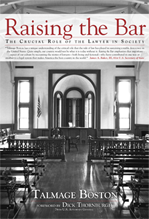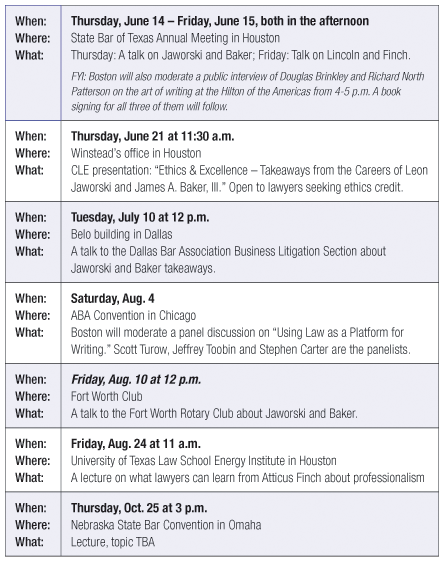Talmage Boston still gets a thrill out of his job – even after spending more than 33 years as a commercial trial and appellate lawyer. Which is precisely why he decided to write his latest book, Raising the Bar.

Raising the Bar has received a considerable amount of attention since its debut in March, which is why Boston is appearing at several speaking engagements over the next few months. One you don’t want to miss is his series of talks at next week’s State Bar of Texas’ annual meeting on June 14-15 in Houston.
Mark Curriden conducts a Q&A with Boston about the ins and outs of writing Raising the Bar.
The Texas Lawbook: Raising the Bar has been out for a couple months now. What kind of feedback are you receiving?
Boston: The feedback has been exceptional. Many lawyers have expressed their thanks for attempting to get the profession’s attitude and reputation out of the ditch, and up on a higher, more positive plane. Several have said, “Thanks for reminding me why I wanted to become a lawyer.” That means the book is fulfilling its purpose.
 TL: How did Raising the Bar initially become a book project?
TL: How did Raising the Bar initially become a book project?
Boston: I was tired of people casting aspersions on our profession one way or another. After 33 plus years of practice, I’m still delighted that I get to be a lawyer every day, and work with and against outstanding practitioners. It seemed to me that lawyers needed a wake-up call or a refresher course on why what we do is so important in American society, and I chose this book as my vehicle for doing that.
TL: In researching Abraham Lincoln and Atticus Finch, was there something you learned that surprised you about either?
Boston: Until I did my research on Chapter 1, I didn’t realize the specifics of what a consummate trial and appellate lawyer Abraham Lincoln was, and how he saw that the trial lawyer’s role should be to serve as grease to lubricate society’s machinery. And I didn’t realize that Atticus Finch was not a fictional creature of Harper Lee’s imagination, but rather was a thinly veiled description of her father, Amasa Lee, who essentially did all the wonderful things Atticus Finch did.
TL: Is there something that disappointed you to learn about them?
Boston: No, they both came through my research untarnished – at the top of the mountain as to what lawyers should aspire to be.
TL: Obviously, To Kill a Mockingbird has had a significant impact on the way our society views the criminal justice system, the need for zealous advocacy and the right to fair trials. What lessons does Atticus Finch give to young lawyers today?
Boston: Several things: (1) the lawyers’ duty to represent the poor who can’t afford legal services; (2) the importance of having the courage to represent an unpopular client and an unpopular cause; (3) the lawyer’s duty to see all sides of an issue, and be able to empathize with all involved in a dispute; (4) the value of maintaining a calm professional demeanor in the face of provocation by one’s adversary; and (5) always recognizing a lawyer’s responsibility to be an advocate for our American system of jurisprudence, regardless of the fact that it’s not perfect.
TL: Were you able to discuss your project with Harper Lee?
Boston: In the law, we have the term “vain and useless act.” Harper Lee has been adamant in her refusal to talk to anyone about her book since 1964, so I didn’t think it was worth my time to reach out to her. If she turned down Oprah Winfrey, she’s not going to talk to Talmage Boston.
TL: In Chapter Two, you declare Leon Jaworski and James Baker as the “two most important lawyers of the last 50 years.” Which one of them was more important and why?
Boston: If you’re a litigator, Jaworski is the ultimate role model. If you’re a transactional lawyer, Baker’s the ultimate role model. They were equally superior in their respective arenas.
TL: Did you meet Leon Jaworski prior to his death in 1982? If so, tell us about it.
Boston: I never met Jaworski before he died. But my uncle, Charles Boston (one of the mentors to whom I dedicated the book), spent his career as a defense litigator at Fulbright Jaworski (where he headed up the medical malpractice defense section for years), so I grew up hearing about him. I was riveted to everything he did in the case of US v. Nixon while I was in college, and it made me relish the prospect of going to law school.
TL: Did Fulbright & Jaworski cooperate with your research? If so, how?
Boston: Jaworksi wrote a total of four books, which completely told his story, so there wasn’t a whole lot of research needed to tell his story. I also read some books on the Watergate scandal. Jaworski’s great friend and former partner Gibson Gayle (former State Bar president) allowed me to interview him, and Gib gave me a few tweaks on the chapter. Museum designer Steve Harding (a friend of mine) also gave me information — it was Steve who designed the display on Jaworski’s life and career on the floor of the main reception desk at the firm’s office in Houston. Also, Richard Ben-Veniste, a member of his Watergate Special Prosecutor team, also gave me lots of important feedback on what I tried to say about Jaworski’s performance in pursuing President Nixon.
TL: Do you think that young lawyers today – or even most older lawyers – truly comprehend how courageous Jaworski was to stand up to President Nixon?
Boston: I hope so. If they don’t, I hope they’ll read my book or Jaworski’s books in order to understand the importance of what he did in preserving the Rule of Law, establishing once and for all that no person — not even a president of the United States — is above the law.
TL: Why is James Baker as great of a lawyer as Leon Jaworski? Most people, I think, would agree that Baker is a great statesman. But why a great lawyer?
Boston: Because the transactional lawyer’s job is to counsel his client, and then negotiate and consummate complicated transactions with much on the line. And that’s exactly what Baker did as a lawyer and a statesman. When I interviewed him for the book, I asked him if there was any difference from his perspective in counseling a client in his private practice, as opposed to counseling Presidents Reagan and Bush, and he said there really wasn’t. He also said that whether you’re a business lawyer or a diplomat, in order to get a deal done, you must grasp the import of “principled pragmatism” so you can succeed in getting a good deal closed, even if it’s not a 100 percent perfect deal —because that’s what clients (and presidents) want.
TL: Many lawyers want to write books. True, most of them want to write about themselves and how great they are. But give our readers a little insight into how much research and work it is to write a book.
Boston: In order to write a book, you must first come up with a marketable subject that you’re reasonably sure will be appealing to an agent or publisher to the point that upon completion it will be worth their time and money to get involved with. Next, you should create a specific outline of what you want the book to cover. Then you need to research your subjects as fully as you can, so as to feel confident that the facts you rely on to tell your story are accurate. Upon completing the research, then you write (and rewrite and rewrite and rewrite…) the book until you’re satisfied it’s as good as it can get. My chapters each involve at least 15 major editorial revision run-throughs. For a first time author, you should go ahead and complete your entire book before making a pitch to an agent or publisher. The world is full of author wannabes who have no trouble starting a book, but somehow just can’t get around to finishing it. Only after you have a track record of finishing books is a writer in a position to attract an agent or publisher before he’s finished his whole book.
TL: Your first two books were about my favorite subject, baseball. What’s your next book?
Boston: Not sure. My best guess, as of now, is that it will have a spiritual theme.
Below is a list of Boston’s upcoming speaking engagements and book signings.
PLEASE NOTE: Content of The Texas Lawbook is controlled and protected by specific licensing agreements with our subscribers and under federal copyright laws. Any distribution of this content without the consent of The Texas Lawbook is prohibited.

